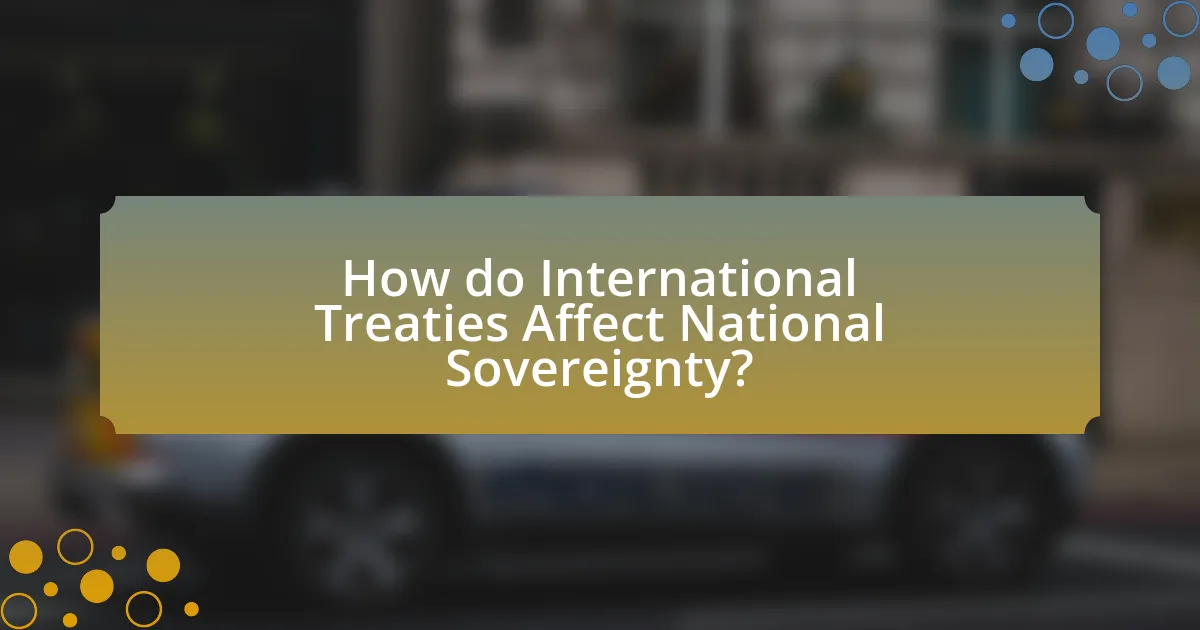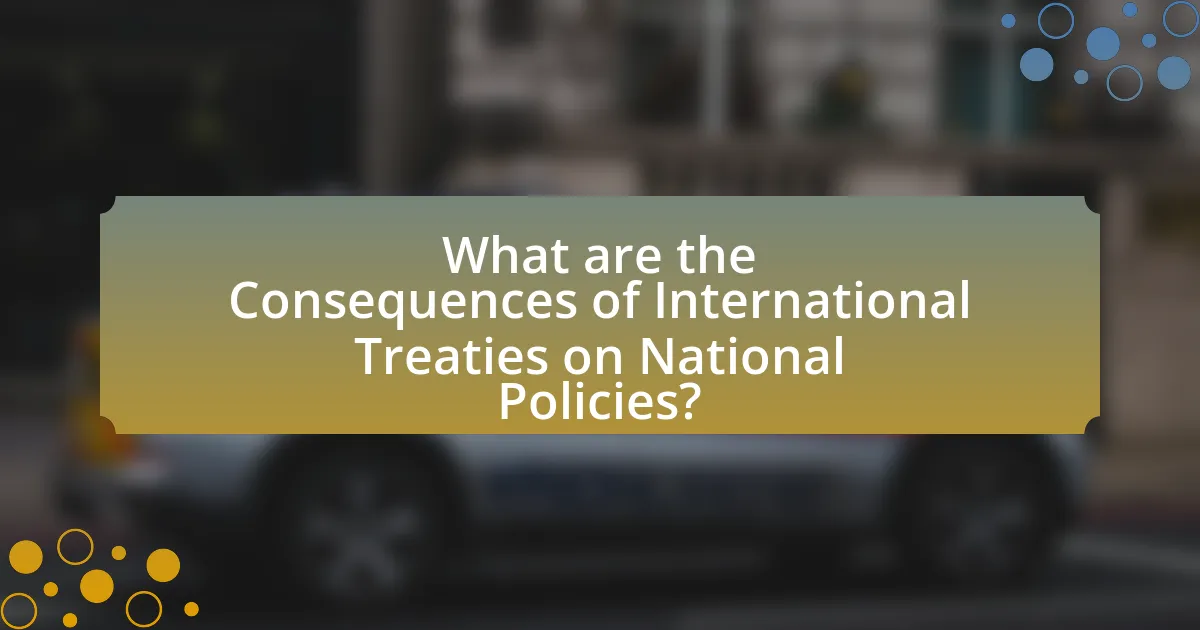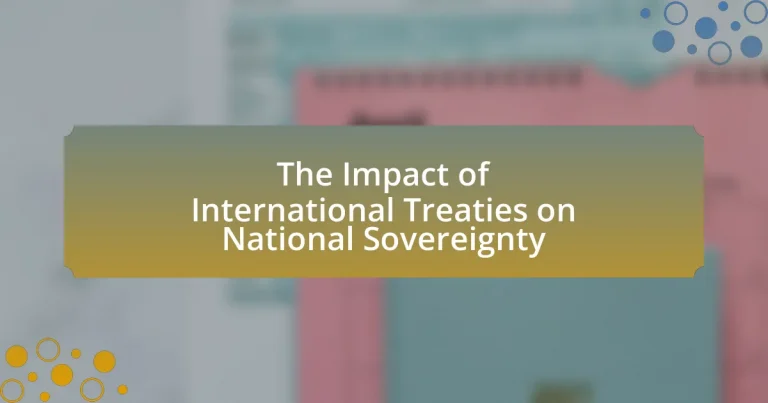International treaties are formal agreements between sovereign states or international organizations that create legally binding obligations, primarily aimed at regulating aspects of international relations such as trade, security, human rights, and environmental protection. The article examines how these treaties influence national laws, the key components involved in treaty formation, and the ratification process by nations. It also explores the balance between international cooperation and national sovereignty, detailing the benefits and challenges treaties present, including their impact on domestic policies, human rights, and national identity. Additionally, the article discusses the implications of treaties on public perception of sovereignty and offers best practices for nations engaging with international agreements.

What are International Treaties and Their Purpose?
International treaties are formal agreements between sovereign states or international organizations that establish legally binding obligations. Their primary purpose is to regulate various aspects of international relations, such as trade, security, human rights, and environmental protection. For instance, the Treaty on the Non-Proliferation of Nuclear Weapons, established in 1968, aims to prevent the spread of nuclear weapons and promote peaceful uses of nuclear energy, demonstrating how treaties can address global security concerns.
How do international treaties influence national laws?
International treaties influence national laws by establishing binding obligations that countries must incorporate into their domestic legal frameworks. When a nation ratifies a treaty, it commits to aligning its laws with the treaty’s provisions, which can lead to significant legal reforms. For example, the United Nations Convention on the Rights of the Child requires signatory countries to adopt laws that protect children’s rights, prompting many nations to amend their legislation accordingly. This process demonstrates how international agreements can shape national legal standards and practices, reinforcing the interconnectedness of global governance and domestic law.
What are the key components of an international treaty?
The key components of an international treaty include the preamble, definitions, substantive provisions, procedural provisions, and final clauses. The preamble outlines the purpose and context of the treaty, while definitions clarify key terms used throughout the document. Substantive provisions detail the rights and obligations of the parties involved, and procedural provisions specify how the treaty will be implemented and enforced. Final clauses address issues such as amendments, dispute resolution, and the treaty’s entry into force. These components are essential for ensuring clarity, mutual understanding, and legal enforceability among the parties, as evidenced by the Vienna Convention on the Law of Treaties, which provides a framework for treaty formation and interpretation.
How are treaties ratified by nations?
Treaties are ratified by nations through a formal process that typically involves negotiation, signature, and legislative approval. Initially, representatives of the nations negotiate the terms of the treaty, which is then signed by authorized officials, indicating the intention to be bound by its provisions. Following the signature, each nation must undergo its domestic legal process, which often requires approval from the legislature or parliament. For example, in the United States, the Senate must provide consent for ratification, as stipulated in Article II, Section 2 of the Constitution, which mandates that treaties require a two-thirds majority vote. This process ensures that the treaty is legally binding within the nation and reflects the will of its governing body.
Why do countries enter into international treaties?
Countries enter into international treaties to establish legally binding agreements that facilitate cooperation, promote peace, and address global challenges. These treaties enable nations to collaborate on issues such as trade, environmental protection, and security, thereby enhancing mutual benefits and stability. For instance, the Paris Agreement on climate change exemplifies how countries collectively commit to reducing greenhouse gas emissions, demonstrating a shared responsibility for global environmental health. Such agreements often reflect the necessity for countries to work together in an increasingly interconnected world, where unilateral actions may be insufficient to tackle complex issues.
What are the benefits of international cooperation through treaties?
International cooperation through treaties provides several key benefits, including enhanced peace and security, economic collaboration, and the establishment of international norms. Treaties facilitate conflict resolution by providing a legal framework for negotiation and cooperation, which can reduce the likelihood of war; for instance, the Treaty of Versailles aimed to prevent future conflicts after World War I. Additionally, treaties often promote trade and economic partnerships, as seen in agreements like the North American Free Trade Agreement (NAFTA), which increased trade among the U.S., Canada, and Mexico. Furthermore, treaties help establish international standards on issues such as human rights and environmental protection, fostering a collective approach to global challenges. These benefits demonstrate how treaties can strengthen international relations and contribute to global stability.
How do treaties address global issues like climate change and security?
Treaties address global issues like climate change and security by establishing binding commitments among nations to cooperate on these challenges. For instance, the Paris Agreement, adopted in 2015, requires countries to set and achieve nationally determined contributions to reduce greenhouse gas emissions, thereby directly targeting climate change. Similarly, treaties such as the Treaty on the Non-Proliferation of Nuclear Weapons (NPT) aim to prevent the spread of nuclear weapons and promote disarmament, addressing security concerns. These agreements create frameworks for accountability and collaboration, enabling nations to collectively tackle issues that transcend borders, thereby reinforcing the importance of international cooperation in addressing global challenges.

How do International Treaties Affect National Sovereignty?
International treaties can limit national sovereignty by requiring states to adhere to agreed-upon rules and regulations that may supersede domestic laws. When a country ratifies a treaty, it often commits to conforming its policies and practices to the treaty’s stipulations, which can restrict its ability to act independently in certain areas. For example, the European Union’s treaties mandate member states to align their laws with EU regulations, thereby ceding some degree of legislative authority to the EU institutions. This dynamic illustrates how international agreements can create obligations that influence national decision-making processes, effectively balancing national interests with international commitments.
What is the relationship between international treaties and national sovereignty?
International treaties can limit national sovereignty by imposing obligations that states must adhere to, thereby restricting their autonomy in certain areas. When a country ratifies a treaty, it agrees to follow the terms set forth, which can include regulations on trade, human rights, environmental standards, and military cooperation. For instance, the United Nations Charter obligates member states to uphold international peace and security, which can constrain a nation’s ability to act independently in foreign affairs. This relationship illustrates that while treaties can enhance cooperation and stability among nations, they also require states to cede some degree of control over their domestic and foreign policies.
How do treaties limit or enhance a nation’s sovereignty?
Treaties can limit a nation’s sovereignty by imposing binding obligations that require compliance with international laws and standards, which may restrict a country’s ability to act independently. For instance, the Treaty on the Non-Proliferation of Nuclear Weapons (NPT) obligates signatory states to refrain from developing nuclear weapons, thereby limiting their sovereign right to pursue certain military capabilities. Conversely, treaties can enhance a nation’s sovereignty by providing frameworks for cooperation that strengthen security and economic stability, allowing countries to exert greater influence collectively. The North Atlantic Treaty Organization (NATO) exemplifies this, as member states enhance their security through mutual defense commitments, which can lead to a more stable and sovereign position in international relations.
What are examples of treaties that have impacted national sovereignty?
Examples of treaties that have impacted national sovereignty include the Treaty of Westphalia, the Treaty of Versailles, and the North Atlantic Treaty. The Treaty of Westphalia, signed in 1648, established the principle of state sovereignty and laid the groundwork for modern international relations by recognizing the rights of states to govern themselves without external interference. The Treaty of Versailles, concluded in 1919, imposed significant territorial and military restrictions on Germany, affecting its sovereignty and leading to political instability. The North Atlantic Treaty, signed in 1949, created NATO, which obligates member states to mutual defense, thereby influencing their sovereignty through collective security commitments. These treaties illustrate how international agreements can shape and sometimes limit the autonomy of nations.
Why do some nations resist international treaties?
Some nations resist international treaties due to concerns over national sovereignty and the potential loss of control over domestic policies. For instance, countries may fear that adhering to international agreements could limit their ability to legislate independently or respond to local needs effectively. Historical examples include the United States’ reluctance to ratify the Kyoto Protocol, which was driven by apprehensions about economic impacts and regulatory constraints on domestic industries. Additionally, nations may prioritize national interests or security over international commitments, leading to selective engagement with treaties that align with their strategic goals.
What are the arguments against ceding sovereignty to international agreements?
Arguments against ceding sovereignty to international agreements include concerns over loss of national autonomy, potential conflicts with domestic laws, and the risk of external influence on national decision-making. National autonomy is compromised when countries must adhere to international regulations that may not align with their specific needs or values. For instance, the European Union’s regulations can supersede national laws, leading to tensions between EU mandates and local governance. Additionally, critics argue that international agreements can impose constraints that hinder a nation’s ability to respond to unique domestic challenges, as seen in trade agreements that may prioritize multinational corporations over local industries. Furthermore, the fear of external influence arises when international bodies dictate policies that affect national interests, potentially undermining democratic processes and accountability. These arguments highlight the complexities and potential drawbacks of ceding sovereignty in favor of international cooperation.
How do domestic political factors influence treaty acceptance?
Domestic political factors significantly influence treaty acceptance by shaping the preferences and priorities of decision-makers and the public. Political parties, interest groups, and public opinion can either support or oppose treaties based on perceived national interests, ideological alignment, or potential impacts on domestic policies. For instance, in the United States, the Senate’s ratification of treaties requires a two-thirds majority, meaning that partisan dynamics can heavily affect outcomes; treaties aligned with the ruling party’s agenda are more likely to be accepted. Additionally, public sentiment can sway political leaders; a 2016 Pew Research Center survey indicated that 60% of Americans believed international agreements should prioritize U.S. interests, reflecting how domestic views can dictate treaty negotiations and acceptance.

What are the Consequences of International Treaties on National Policies?
International treaties significantly influence national policies by requiring countries to align their domestic laws and regulations with international standards. This alignment often leads to changes in legislation, as nations must comply with treaty obligations to maintain their standing in the international community. For instance, the Paris Agreement on climate change compels signatory countries to implement policies aimed at reducing greenhouse gas emissions, which can result in substantial shifts in energy, transportation, and industrial regulations. Additionally, treaties can limit a nation’s ability to enact certain policies independently, as seen in trade agreements that impose tariffs and quotas, thereby affecting economic sovereignty. The necessity for compliance with international law can also lead to legal challenges within national courts, as domestic laws may conflict with treaty obligations.
How do treaties shape domestic legislation and policy-making?
Treaties shape domestic legislation and policy-making by establishing binding legal obligations that countries must incorporate into their national laws. When a state ratifies a treaty, it often requires changes to existing laws or the creation of new legislation to comply with the treaty’s provisions. For example, the United Nations Convention on the Rights of the Child necessitated many countries to amend their laws to align with international standards for children’s rights. This process demonstrates how international agreements can directly influence domestic legal frameworks and policy priorities, thereby affecting national sovereignty by compelling states to adhere to external norms and regulations.
What are the implications for human rights policies under international treaties?
International treaties significantly shape human rights policies by establishing binding legal standards that countries must adhere to. These treaties, such as the International Covenant on Civil and Political Rights, compel nations to align their domestic laws with international human rights norms, thereby enhancing the protection of individual rights. For instance, countries that ratify such treaties are obligated to implement measures that prevent human rights violations, which can lead to legal accountability for abuses. Additionally, the monitoring mechanisms associated with these treaties, such as periodic reviews by committees, create pressure on states to improve their human rights records, thereby influencing national policies and practices.
How do economic treaties affect national trade policies?
Economic treaties significantly shape national trade policies by establishing binding agreements that govern trade relations between countries. These treaties often lead to the reduction of tariffs, the elimination of trade barriers, and the promotion of fair competition, which directly influences how nations formulate their trade regulations. For instance, the North American Free Trade Agreement (NAFTA) reduced tariffs among the U.S., Canada, and Mexico, resulting in increased trade flows and economic integration among these countries. Such treaties compel nations to align their domestic policies with international standards, thereby limiting their ability to enact protectionist measures. This alignment is evidenced by the World Trade Organization (WTO) agreements, which require member countries to adhere to specific trade rules, thus constraining unilateral policy changes that could disrupt international trade relations.
What are the long-term effects of treaties on national identity?
Long-term effects of treaties on national identity include the potential for altered perceptions of sovereignty and cultural integration. Treaties often require nations to adopt new policies or standards that can reshape national narratives and collective identities. For instance, the European Union treaties have led member states to adopt shared regulations, which can dilute distinct national characteristics over time, fostering a more unified European identity. Additionally, treaties addressing human rights, such as the International Covenant on Civil and Political Rights, can influence national identity by embedding universal values into domestic laws, thereby reshaping citizens’ understanding of their rights and responsibilities. These changes illustrate how treaties can have profound and lasting impacts on the way nations define themselves and relate to their citizens.
How do treaties influence public perception of national sovereignty?
Treaties influence public perception of national sovereignty by creating a framework for international cooperation that can be perceived as a limitation on a nation’s autonomy. When countries enter into treaties, they often agree to adhere to certain standards or regulations that may restrict their ability to act independently in specific areas, such as trade, environmental policy, or human rights. For example, the European Union’s treaties require member states to comply with common laws and regulations, which can lead to public concerns about the erosion of national decision-making power. This perception is further reinforced by media coverage and political discourse that frame treaty obligations as compromises of sovereignty, leading to a complex relationship where citizens may feel both empowered by international collaboration and constrained by the obligations that come with it.
What role do treaties play in shaping national narratives and values?
Treaties play a crucial role in shaping national narratives and values by formalizing commitments between states that reflect shared principles and goals. These agreements often embody ideals such as peace, cooperation, and human rights, which can influence a nation’s identity and public perception. For instance, the Treaty of Versailles in 1919 not only ended World War I but also established a narrative of accountability and reconciliation that shaped European relations for decades. Similarly, the United Nations Charter, signed in 1945, enshrined values of collective security and human dignity, which have since become integral to many nations’ self-conceptions and policies. Thus, treaties serve as foundational texts that guide national discourse and inform citizens’ understanding of their country’s role in the global community.
What best practices can nations adopt when engaging with international treaties?
Nations can adopt several best practices when engaging with international treaties to ensure effective participation and safeguard their sovereignty. First, conducting thorough legal and policy assessments before entering treaties helps nations understand the implications on domestic laws and sovereignty. For instance, the Vienna Convention on the Law of Treaties emphasizes the importance of consent and understanding the obligations that treaties impose.
Second, involving multiple stakeholders, including government agencies, civil society, and the private sector, fosters a comprehensive approach to treaty negotiation and implementation. This inclusive process can enhance legitimacy and public support, as seen in the Paris Agreement, where broad participation was crucial for its acceptance.
Third, establishing clear mechanisms for monitoring and compliance ensures that nations can uphold their commitments while protecting their interests. The World Trade Organization provides a framework for dispute resolution that allows nations to address grievances without compromising their sovereignty.
Finally, regular reviews and updates of treaty commitments enable nations to adapt to changing circumstances and maintain control over their national policies. This practice is evident in the periodic reviews of the Convention on Biological Diversity, which allows nations to reassess their commitments in light of new scientific evidence and socio-economic changes.


